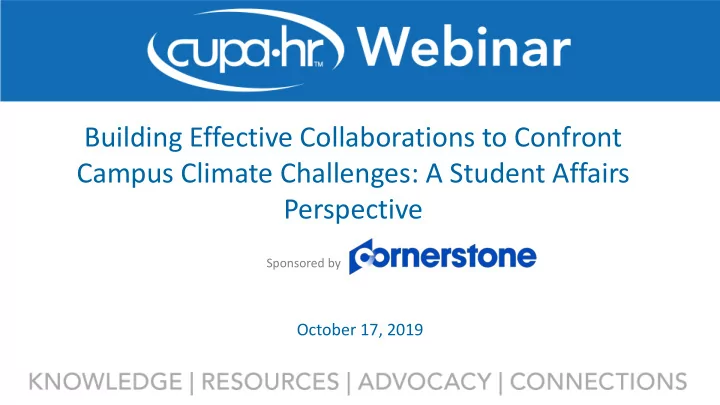

Building Effective Collaborations to Confront Campus Climate Challenges: A Student Affairs Perspective Sponsored by October 17, 2019
Need Help? Send us a message via the Chat box, or email us at: cupahr@commpartners.com
Q & A Don't forget to submit your questions to our presenters. How? Click on the Chat box at the bottom left of your screen and be sure to click “send.”
Poll Questions Click on your screen in the box next to your answer choice.
Handouts Available for download in the “Links” section of your dashboard.
Continuing Education Credit
Archived Recording Visit https://www.cupahr.org/events/webinars/
Building Effective Collaborations to Confront Campus Climate Challenges: A Student Affairs Perspective Sponsored by October 17, 2019
Presenters Monica Nixon, Ed.D. Assistant Vice President for Equity, Inclusion, and Social Justice NASPA - Student Affairs Administrators in Higher Education
Outcomes Enhanced understanding of: • who we are educating on college and university campuses • student development theory in practice • push points and activism on campuses • ways that HR, student affairs, CDIOs, and others can partner to build cultures of respect and belonging
https://studentaffairscollective.org/sa-assessment-sense-open-letter-leaders/4f3385f92a571ea85811e3e72e7c044f/
Poll Question Select all that apply: Our divisions are very familiar with one another’s work Our divisions have very little idea what the other does We work together regularly outside of hiring and termination processes We compete for resources
Student Affairs Speak Student Vice Student affairs/student president/ Challenge engagement life/student dean of and support development students Resilience Theory to Vectors and well- Discernment practice being First- Community Student generation building success student
Poll Question How often do you experience your campus HR working with Student Affairs? a) Very often b) Somewhat often c) Not at all
Poll Question How often do you believe your campus HR should work with Student Affairs? a) Very often b) Somewhat often c) Not at all
Who are today’s students …
Total Enrollment, Spring 2019 17,839,330 All Sectors 17,542,109 -1.7% 5,291,753 Two Year, Public -3.4% 5,114,013 925,532 -19.7% Four Year, For-Profit 743,536 7,664,873 Four Year, Public -0.9% 7,598,237 3,696,972 Four Year, Private Nonprofit +3.2% 3,803,576 Source: National Student Clearinghouse Research Center (2019) https://nscresearchcenter.org/currenttermenrollmentestimate-spring2019/
Student Characteristics, All Sectors, Spring 2019 Program Level Undergraduate, 14,813,493 Graduate, 2,728,616 Age Group 24 & Under, 11,235,492 Over 24, 6,306,617 Intensity Level Full-Time, 10,929,767 Part-Time, 6,612,342 Gender Women, 10,180,277 Men, 7,361,832 Source: National Student Clearinghouse Research Center (2019) https://nscresearchcenter.org/currenttermenrollmentestimate-spring2019/
… and what are they experiencing in college?
Paul Gordon Brown, 2015
Understanding Theory • Identity Development • Self-Authorship (Baxter-Magolda) • Involvement (Astin) • Critical theory and asset-based paradigms • Critical Race Theory (Delgado & Stefancic, 2012) • Community Cultural Wealth (Yosso, 2006)
Chat Question Share how you believe HR and Student Affairs can work together to enrich the student experience?
Free Speech vs Social Justice Hate Speech Grades Sense of Belonging Eating Disorders
Sarah Rogers, The Daily Beast cdn.lightgalleries.net Samuel Corum/Anadolu Agency via Getty Images
Disparate Impact • Identity Taxation (Hirshfield & Joseph, 2012) • Racial Battle Fatigue (Smith, Yosso, & Solórzano, 2011) • Emotional Labor (Bellas, 1999; Harlow, 2003; Pugliesi, 1999)
Activism on campus
www.nytimes.com August 4, 2017
Trauma-Informed Leadership • Understand social, cultural, and political contexts on campus • Avoid routinized responses • Acknowledge and engage collective trauma through active listening, speaking from the heart, and “acting with” • Build capacity through sustained commitment to issues of equity, inclusion, and social justice Kezar, A. & Fries-Britt, S. (2018). Speaking truth and acting with integrity: Confronting challenges of campus racial climate. Washington, DC: American Council on Education.
Campus leadership to enhance inclusion
Opportunities for Campus-Wide Leadership • Implementing campus inclusion plans and strategies for sustainable, systemic change • Creating opportunities for professional development and accountability to enhance inclusion • Anticipating and responding v. reacting to activism and crises • Implementing state and federal policy changes
Resources • NASPA Online Learning Community • NASPA Publications • Crisis, Compassion, and Resiliency (2019), Treadwell & Russell O’Grady (Eds.) • Landscape analyses • 5 Things briefs • Journals
Discussion • What challenges are you facing on your campus? • What partnership strategies have worked well on your campus? • Where have you encountered obstacles or challenges?
Questions? Monica Nixon mnixon@naspa.org
Thank You! Building Effective Collaborations to Confront Campus Climate Challenges: A Student Affairs Perspective October 17, 2019 Sponsored by
Recommend
More recommend